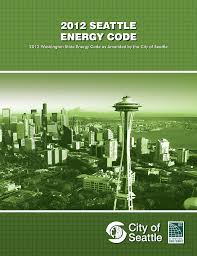The 2012 Washington Energy Code, based on the 2012 International Energy Conservation Code, went into effect July 1, 2013. It is up to individual jurisdictions to decide when to start using the new code, and some jurisdictions (including the City of Renton) adopted it as of July 1. Other jurisdictions we have talked to plan to begin implementing the code changes in the next couple of months. Be sure to check with the permitting jurisdiction to find out which version of the code your project will be permitting under.
City of Seattle Draft Energy Code: Additional Information & Clarifications
On June 24, 2013, Duane Jonlin of the City of Seattle talked to the ASHRAE TEGA group about upcoming changes to Seattle’s energy code. We learned some new information about the code changes that we thought might be of interest to you. We’ve listed some highlights below. As always, feel free to contact us if you have any questions, and we’ll do our best to help you out!
The new Seattle codes went into effect on December 26, 2013.
There will be no Seattle Residential Energy Conservation Code; the Washington State amendments to the 2012 Residential International Energy Conservation Code will apply to single family homes, duplexes, townhouses, and 1-3 story multi-family buildings in Seattle.
Permit applications will need to include calculations by your mechanical engineer for fan motor energy use (similar to LEED) along with the HVAC load calculations, and energy factor (EF) calculations for new water heaters, to show these systems meet the energy code requirements.
Substantial alteration clarification. The draft code indicates that “substantial alteration” projects will be required to upgrade the entire building envelope to within 20% of current energy code. FSi asked the city to clarify the criteria for determining if a project is a substantial alteration. While the city will make final determination on a case-by-case basis, the city responded that change of occupancy types, and re-opening of a building that has been vacant for a significant period of time are likely to qualify as substantial alterations. Simple tenant improvements, including basic equipment replacements, are not likely to trigger this requirement. More complete building improvements like new siding, a complete interior remodel, or a complete replacement of mechanical systems will require discussion with the code official prior to permitting, to determine whether the substantial alteration clause is triggered.
50% of electrical outlets in offices and classrooms must be controlled by an occupancy sensor or time clock to turn off. Half of the outlets in offices and classrooms must be controlled to shut off at night or during periods of low occupancy, be located within 72 inches of non-controlled outlets, and be visibly differentiated from other outlets in the space. The control is either by occupancy sensor, or a time-of-day switch, and the maximum area of control is 5,000 sf. The other 50% of the outlets may provide the 24-hour power needed for equipment such as computers and refrigerators. This is outlined in section C405.14 of the draft code. This is important because it will require more wiring and a significant occupant education effort (what are all these colored outlets and why does my computer keep restarting every night?)
Clarification on glazing requirements. We previously reported code language requiring “40% maximum on glazing with 75% of that glazing being double pane windows, and 25% being triple pane windows.” The city clarified that the area tradeoff method may be used, which means with high performance double pane windows, you may be able to use double pane windows for an entire building, and windows comprising somewhere in the range of 42-45% of wall area. Though the code states a strict 40% maximum glazing area, this does not appear to be the city’s intention.
Preview of the 2015 Seattle Energy Code.
The city is considering including some of the following items in the next code cycle:
- Limits on electric resistance heating. This will mean using more heat pumps (or fossil fuel heat sources) for space heating.
- More heat recovery and storage on HVAC systems.
- More triple glazing, beyond current levels, providing a lower U-value for more window area.
